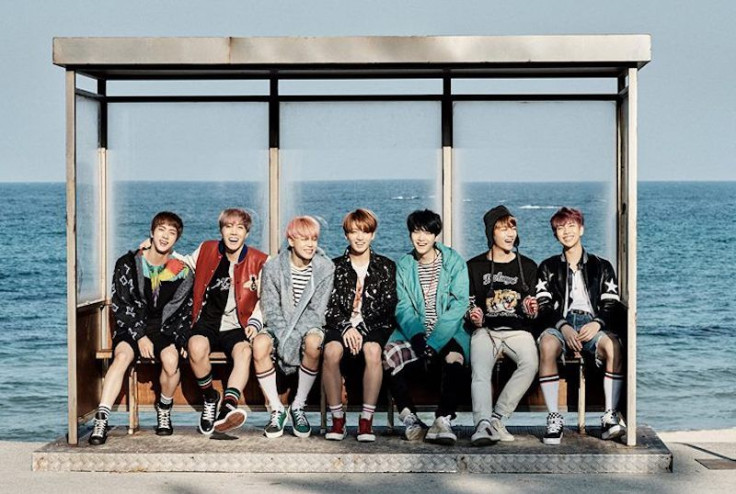BTS: Everything you need to know about the astounding success of the world's favourite K-Pop band

South Korean boy band BTS are in the middle of a sell-out world tour, performing to tens of thousands of people in the United States, Canada, United Kingdom, the Netherlands, Germany and France. But in case you’ve missed their meteoric rise, here’s what you need to know about the latest K-Pop phenomenon.
Simply put: BTS are huge. Jimmy Fallon recently introduced them on The Tonight Show as “the biggest boy band on the planet”, and he might be right. In May this year, they became the first Korean band to top the US Billboard charts with their album Love Yourself: Tear. They have sold more than 2.5m copies of the follow-up compilation album Love Yourself: Answer since its release in August – that’s twice as many sales as One Direction’s last album.
BTS broke onto the scene in Korea with the hit song I Need You in 2015, gradually building momentum through album sales and endless public appearances. Since then, they have bagged all of the most sought-after awards at home: Mnet Asian Music Awards, Seoul Music Awards and the Golden Disk Awards.
Japan can’t get enough of them – there, they’ve played sell-out stadium tours and their albums have achieved double-platinum status. This is an impressive achievement, considering how lucrative the Japanese market is, how it has its own homegrown pop movement (J-Pop) and given the historical tensions and mutual suspicion between the two countries.
Slick and polished
Like all K-Pop bands (or “idols”, as they are known), they look good, move well and know how to sing. They are groomed, micro-managed, slickly packaged and unmistakably K-Pop in look and sound, combining soft masculinity with US-inspired pop genres. They will have endured the usual gruelling training programme before being “debuted” in 2013.
Like other bands, BTS make creative use of social media to communicate with fans in a seemingly more intimate way – from starring in good-humoured “variety shows” on their YouTube channel, to sending positive messages about the need for self-care on Twitter, BTS are so big on social media that Twitter created an emoji just for them. On September 25 they addressed the UN Assembly to launch a campaign to encourage young people to speak up about bullying and abuse.
"I want to hear your voice... No matter who you are, where you’re from, your skin colour, gender identity: speak yourself.”
— UNICEF (@UNICEF) September 24, 2018
We _ @BTS_twt's inspiring message to young people around the world at the UN General Assembly. #GenUnlimited #UNGA #ENDviolence #Youth2030 pic.twitter.com/kWOoSfLkiq
BTS have built on the success of more established K-Pop bands such as Super Junior and Girls Generation, extending beyond the East Asian market into the US and now, tentatively, into Europe. News, gossip and video footage of the band is sought out and shared on social media, much of it translated and subtitled by K-Pop fans into Mandarin, English and even Portuguese (K-Pop artists regularly perform in Brazil, one of their largest markets outside East Asia).
But above all, BTS are big because they are “different”. Managed by Big Hit Entertainment, BTS are reportedly allowed to contribute creatively to the band’s style and sound – a freedom not always afforded to successful K-Pop acts. Big Hit has a relatively good reputation, in an industry known for its ruthless treatment of pop stars. With their well-publicised focus on mental health issues in songs, tweets and their work with UNICEF, BTS seem to have struck a chord with Western audiences.
Fan army
Not a fan club: an ARMY. The word ARMY is the acronym of the rather clumsy “Adorable Representative MC for Youth”, a term chosen by managers Big Hit and readily embraced by the fan base. Like the Beliebers and Swifties, the ARMY is an essential part of their band’s marketing machine.
Their recent success in the US was partly driven by the three million votes accrued through a fan-driven campaign on social media to ensure their success at the Billboard Music Awards. Members of the ARMY are active on social media and have been instrumental in spreading awareness of the band’s UNICEF-sponsored “Love Myself” campaign.
Groups of anonymous fans have also set up support groups on Twitter to help anyone struggling with mental health issues: the biggest account of this type is @BTS_ArmyHelpCentre, where anyone can DM to access mutual support and help regardless of gender, age and nationality.
So, what can you expect from a BTS concert? A tightly choreographed, energetic performance with pitch-perfect harmonies and very fast rapping. Expect the fans to know all the dance moves to their hit songs: they will have been rehearsing too. The noise will be deafening: as well as the music, you’ll hear famous fan chants, in which all the band members get a name check in time to the rhythm of the songs.
Most fans, regardless of nationality, will know all the words of the songs (sung mostly in Korean) and what they mean. They’ll all have a BTS light stick, used to keep rhythm and to create complicated light-based choreography. And expect screaming, plenty of tears, exhaustion and the odd fainting incident. There will likely be a crowd of enthusiastic fans (mostly teenage girls) outside the venue: the concerts sold out in minutes and not many could afford the four-figure resale prices on e-Bay.
Stephanie Dennison, Professor in Brazilian Studies, University of Leeds and Stefania Pozzi, PhD Candidate, University of Leeds
This article is republished from The Conversation under a Creative Commons license. Read the original article.




















